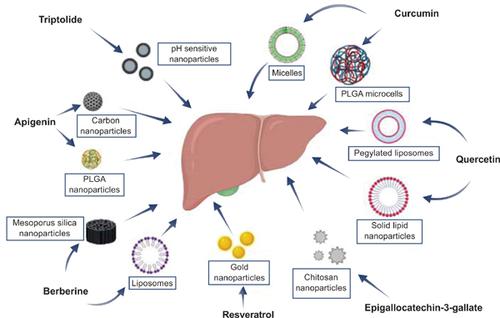Current Topics in Medicinal Chemistry ( IF 2.9 ) Pub Date : 2020-08-31 , DOI: 10.2174/1568026619666191114113048 Sachin Kumar 1 , Faizana Fayaz 2 , Faheem Hyder Pottoo 3 , Sakshi Bajaj 4 , Satish Manchanda 5 , Himangini Bansal 2

|
Liver cancer is the fifth (6.3% of all cancers i.e., 548,000 cases/year) and ninth (2.8% of all cancers i.e., 244,000 cases/year) most prevalent cancer worldwide in men and women, respectively. Although multiple choices of therapies are offered for Hepatocellular Carcinoma (HCC) like liver resection or transplant, radiofrequency ablation, transarterial chemoembolization, radioembolization, and systemic targeted agent, by the time of diagnosis, most of the cases of HCC are in an advanced stage, which renders therapies like liver transplant or resection and local ablation impractical; and targeted therapy has its shortcomings like general toxicity, imprecise selectivity, several adversative reactions, and resistance development. Therefore, novel drugs with specificity and selectivity are needed to provide the potential therapeutic response. Various researches have shown the potential of phytomedicines in liver cancer by modulating cell growth, invasion, metastasis, and apoptosis. However, their therapeutic potential is held up by their unfavorable properties like stability, poor water solubility, low absorption, and quick metabolism. Nonetheless, the advancement of nanotechnology-based innovative nanocarrier formulations has improved the phytomedicines’ profile to be used in the treatment of liver cancer. Nanocarriers not only improve the solubility and stability of phytomedicines but also extend their residence in plasma and accomplish specificity. In this review, we summarize the advancements introduced by nanotechnology in the treatment of liver cancer. In particular, we discuss quite a few applications of nanophytomedicines like curcumin, quercetin, epigallocatechin-3-gallate, berberine, apigenin, triptolide, and resveratrol in liver cancer treatment.
中文翻译:

基于纳米植物医学的新型肝癌治疗策略
肝癌分别是男性和女性中第五大癌症(占所有癌症的6.3%,即548,000例/年)和第九大癌症(占所有癌症的2.8%,即244,000例/年)。尽管针对肝细胞癌(HCC)提供了多种选择,例如肝切除或移植,射频消融,经动脉化学栓塞,放射栓塞和全身靶向治疗,但在诊断时,大多数HCC病例处于晚期,这使得诸如肝移植或切除以及局部消融的疗法不可行;靶向治疗具有其缺点,如一般毒性,选择性不精确,几种不良反应和耐药性发展。因此,需要具有特异性和选择性的新型药物来提供潜在的治疗反应。各种研究表明,通过调节细胞生长,侵袭,转移和凋亡,植物抗癌药具有治疗肝癌的潜力。但是,它们的治疗潜力被其不利的特性所抑制,例如稳定性,差的水溶性,低吸收性和新陈代谢。尽管如此,基于纳米技术的创新性纳米载体制剂的发展改善了用于治疗肝癌的植物药的概况。纳米载体不仅可以提高植物药的溶解度和稳定性,还可以延长其在血浆中的停留时间并实现特异性。在这篇综述中,我们总结了纳米技术在肝癌治疗中取得的进展。特别是,我们讨论了许多纳米植物药的应用,例如姜黄素,槲皮素,表没食子儿茶素-3-没食子酸酯,









































 京公网安备 11010802027423号
京公网安备 11010802027423号